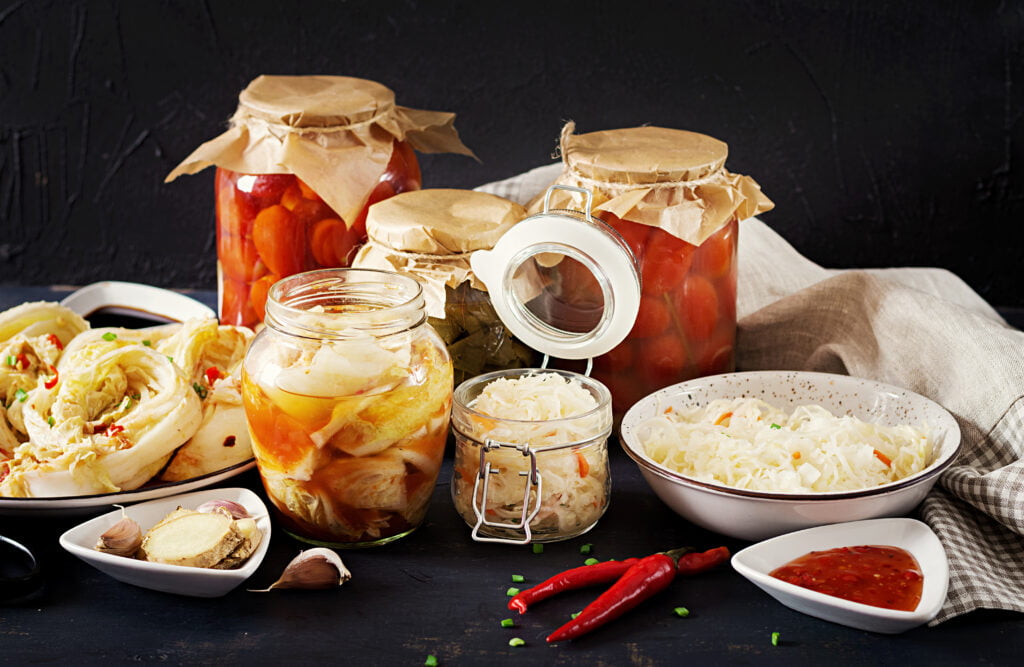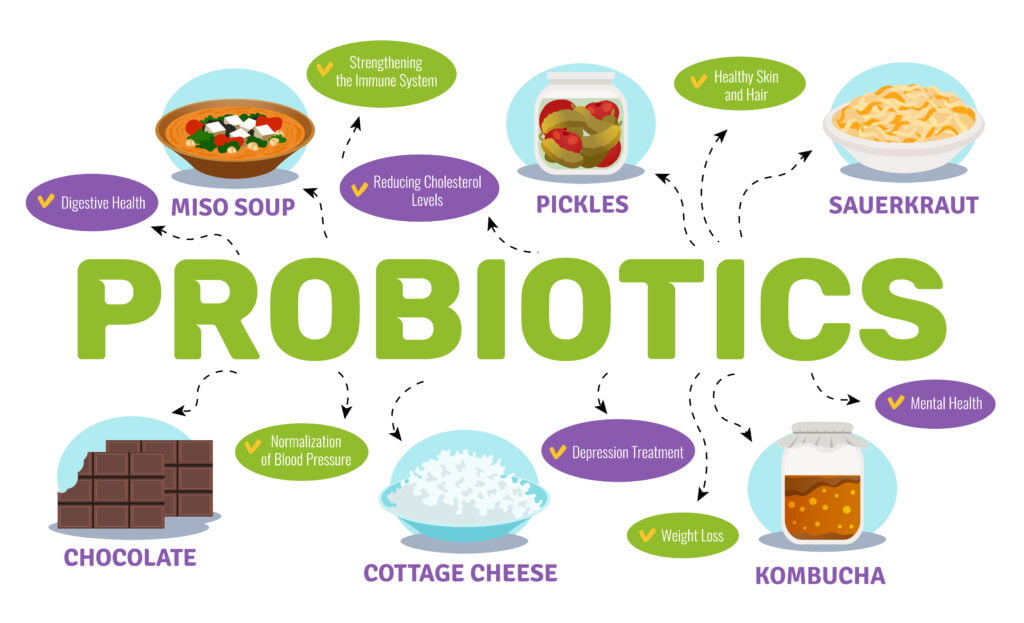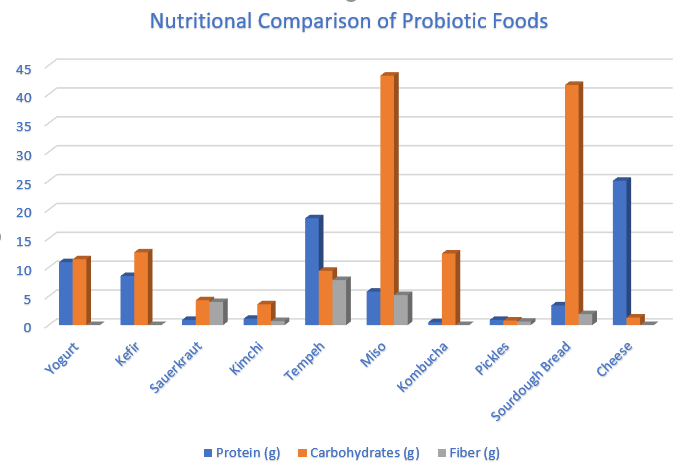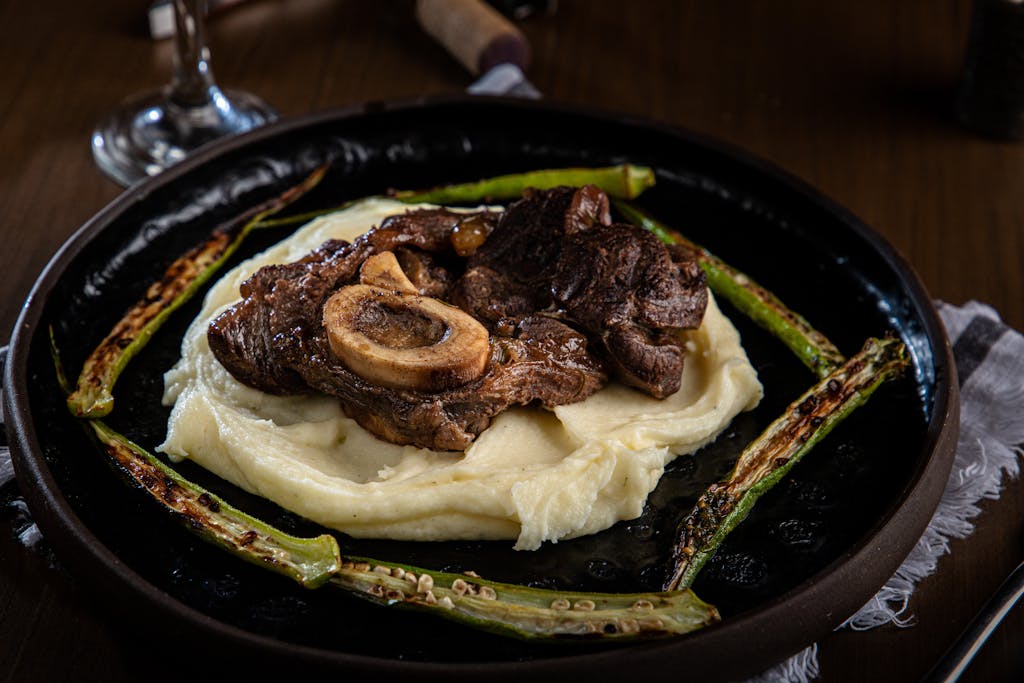FREE SHIPPING OVER $50
Top 10 Probiotic Foods That Help with Digestion
Probiotic foods are becoming increasingly popular as more people recognize the benefits of having a healthy gut. The gut is responsible for digesting food and absorbing nutrients, and having a healthy gut is crucial for overall health and well-being. Probiotic foods are a great way to improve your digestion and support the growth of healthy bacteria in your gut. In this article, we will explore the top 10 probiotic foods that you can easily incorporate into your diet.
What Are Probiotic Foods?

Probiotic foods are foods that contain live bacteria and yeasts that are good for your gut health. These foods help to promote the growth of healthy bacteria in the gut and improve digestion. Probiotic foods are different from prebiotic foods, which contain fiber that helps to feed the healthy bacteria in your gut. Some examples of probiotic foods include yogurt, kefir, sauerkraut, and kimchi.
Benefits of Probiotic Foods
Probiotic foods provide numerous health benefits, including:
- Improving digestion
- Boosting the immune system
- Reducing inflammation
- Promoting weight loss
- Enhancing mental health
- Lowering the risk of certain diseases
Top 10 Probiotic Foods

It is important to note that while dairy products like yogurt, cheese and kefir are generally safe for consumption, those with dairy allergies or lactose intolerance should exercise caution and consult with a healthcare professional before adding it to their diet.
1. Yogurt
Yogurt is a tasty and nutritious probiotic food that can help with digestion. It is made by fermenting milk with live bacteria cultures, which can improve the balance of bacteria in your gut.
One of the main benefits of yogurt is its ability to increase the population of beneficial bacteria in your gut, which can help improve your digestion and overall health.
Yogurt is a good source of:
- Calcium
- Protein
2. Kefir
Kefir is another probiotic-rich food that has been gaining popularity in recent years. It is a fermented milk drink that is made using kefir grains, which contain a mixture of bacteria and yeast. Kefir has a tangy taste and a creamy texture, making it a great alternative to yogurt for those who are lactose intolerant.
Kefir is known to be a rich source of probiotics, containing up to 61 different strains of bacteria and yeast. These beneficial microorganisms help to promote a healthy balance of bacteria in the gut, aiding digestion and boosting overall immune function.
Kefir is a good source of:
- Protein
- Calcium
- Vitamin D
3. Sauerkraut
Sauerkraut is a dish made from fermented cabbage. It is tasty and packs a punch of healthy bacteria that can benefit your gut health. Sauerkraut contains a wide range of probiotics, including Lactobacillus and Leuconostoc.
One of the great things about sauerkraut is that it is versatile and can be used in various dishes. You can use it as a side dish, add it to sandwiches or burgers, or mix it with other foods to create unique flavor combinations. Just make sure to choose the unpasteurized kind, as pasteurization can kill off the beneficial bacteria.
Sauerkraut is a good source of:
- Vitamin C
- Fibre
4. Kimchi
Kimchi is a traditional Korean dish made from fermented vegetables, usually cabbage or radish. It is packed with probiotics, making it an excellent addition to any diet that promotes good digestive health. Kimchi has a spicy and tangy taste, and it is a great way to add some flavor to your meals.
One of the benefits of kimchi is that it contains beneficial bacteria that help to improve gut health. These bacteria can help to improve digestion, boost the immune system, and reduce inflammation in the body. Kimchi is also low in calories and high in fiber, making it an ideal food for those looking to lose weight or maintain a healthy weight.
Kimchi is a good source of:
- Vitamins A
- Vitamins C
- Vitamins K
5. Tempeh
Tempeh is a traditional Indonesian food made from fermented soybeans. It has a nutty and earthy flavor and a slightly firm texture. During the fermentation process, the bacteria in tempeh produce enzymes that break down the soybeans and create a variety of beneficial compounds such as vitamins B2, B6, and B12, as well as antioxidants.
Eating tempeh regularly can help improve gut health, boost immunity, and reduce inflammation in the body. Tempeh can be eaten raw, sautéed, baked, or grilled, making it a versatile ingredient in many dishes.
Tempeh is a good source of:
- Iron
- Protein
- Calcium
6. Miso
Miso is a traditional Japanese seasoning made from fermented soybeans, rice, or barley. It is commonly used in soups, dressings, and marinades.
Aside from its delicious taste, miso is also a great source of probiotics. The fermentation process involved in making miso creates beneficial bacteria, such as Lactobacillus and Bifidobacterium, which can improve gut health and digestion. Additionally, miso is rich in antioxidants and may have anticancer properties.
Miso is high in sodium, so it should be consumed in moderation.
Miso is a good source of:
- Vitamins B
- Vitamins K
7. Kombucha
Kombucha is a fermented tea that has been growing in popularity as a probiotic-rich beverage. It is made by fermenting sweetened tea with a symbiotic culture of bacteria and yeast, which creates a fizzy and slightly tangy drink.
Not only does kombucha contain beneficial probiotics, but it is also a great source of antioxidants and polyphenols. However, it is important to note that the alcohol content of kombucha can vary, so it may not be suitable for individuals who are avoiding alcohol altogether. It is also recommended to consume kombucha in moderation and to choose brands that have been tested for safety and quality.
Kombucha is a good source of:
- Vitamins B
- Caffeine.
8. Pickles
Pickles are cucumbers that have been fermented in saltwater solution, which allows beneficial bacteria to thrive and multiply. The result is a tangy and crunchy snack that is also good for your gut health.
It’s important to note that not all pickles are created equal in terms of their probiotic content. Pickles made using vinegar, for example, do not contain live probiotic cultures as the vinegar kills the bacteria during the pickling process. Therefore, if you’re looking to reap the probiotic benefits of pickles, it’s best to opt for naturally fermented pickles.
Pickles are good sources of:
- Vitamin K
9. Sourdough Bread
Sourdough bread is a type of bread made from a sourdough starter, which is a mixture of flour and water that naturally ferments over time. This fermentation process produces lactic acid and acetic acid, which give the bread its characteristic tangy flavor and help to break down the gluten in the bread, making it easier to digest.
In addition to its unique taste, sourdough bread is also a good source of probiotics. The lactic acid bacteria produced during the fermentation process help to populate the gut with beneficial bacteria, improving digestion and overall gut health.
Sourdough bread is a good source of:
- Minerals
- Fibre
10. Cheese
Cheese is another great source of probiotics, as it is made by the fermentation of milk by lactic acid bacteria. The exact type and amount of probiotics in cheese depend on the specific cheese variety, but some of the most common strains found in cheese include Lactobacillus and Bifidobacterium.
It is important to note that not all cheese varieties are probiotic-rich, and the probiotic content can vary depending on the cheese-making process. Soft, unpasteurized cheeses like Brie and Camembert are often high in probiotics, while hard, processed cheeses may have a lower probiotic content.
Cheese is a good source of:
- Calcium
- Protein.
Nuritional Comparison
Below is a chart that compares the amount of Protein, Carbohydrates and Fiber in these 10 probiotic foods. This chart is intended for those who worry about adding excess carbs to their diet.

Please note that these values may vary based on the brand and specific type of each food
FAQs
Yes, some types of cheese contain probiotics that can improve gut health. However, it is important to choose the right types of cheese and eat them in moderation.
There is some evidence to suggest that probiotic foods may aid in weight loss, although more research is needed. Studies have shown that certain strains of probiotics can help regulate appetite, increase feelings of fullness, and reduce calorie absorption.
For most people, consuming probiotic foods is safe and does not cause any negative side effects. However, some people may experience mild digestive symptoms such as gas, bloating, or diarrhea when they first start consuming probiotics.
Conclusion
Probiotic foods are a great addition to any diet, as they offer numerous health benefits. From improving digestion and boosting the immune system to reducing inflammation and promoting heart health, probiotic foods are a true superfood. By incorporating more probiotic foods into your diet, you can help support your overall health and wellbeing. So go ahead and enjoy some delicious yogurt, kefir, kimchi, or sauerkraut, and give your gut the love it deserves!
If you found this blog post insightful, explore more by delving into our related articles:
- Top 12 Best Supplements for Kidney Health
- Top 10 Best Supplements for Bloating in 2024
How Gut Health and Probiotics Affect Your Overall Well-being
How Can a Prediabetes Diet Influence Your Health and Well-being?
- Low FODMAP Diet Essentials: A Beginner’s Guide + Diet Plan
- Top 10 Best Hydrogen Water Bottles for 2024







